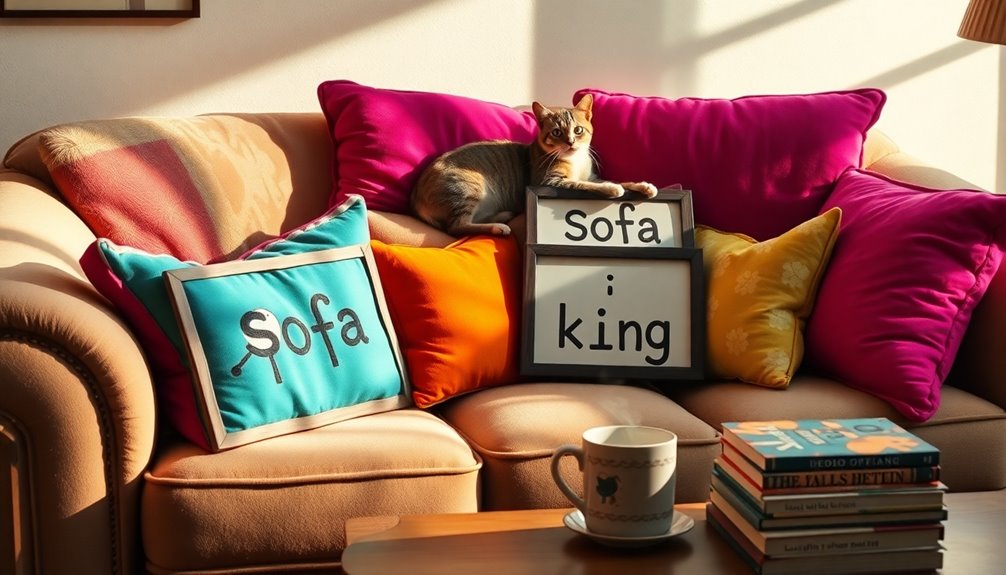"Sofa King" is generally seen as a humorous euphemism rather than an outright bad word, but opinions vary. Originating from a 1999 album, it gained popularity through internet memes and marketing slogans, often avoiding profanity. However, some people find it offensive, leading to actions like the ASA banning certain uses of the phrase. It highlights the complexities of language and how humor can soften words. While younger generations might appreciate its playfulness, others view it as inappropriate. If you're curious about its cultural impact and public reactions, there's more fascinating info to explore.
Key Takeaways
- "Sofa King" is a euphemistic pun that disguises profanity, making it humorous rather than offensive to some audiences.
- The phrase has received mixed reactions, with some finding it clever and others deeming it inappropriate, reflecting generational divides.
- Advertising standards, such as those from the ASA, have restricted its use due to potential offensiveness, indicating societal sensitivities.
- The term gained popularity through internet culture and marketing, showcasing its appeal to younger generations valuing humor and creativity.
- Interpretations of "Sofa King" vary, with younger demographics often recognizing it as humorous, while older audiences may find it offensive.
Origin of "Sofa King"

Have you ever wondered where the term "Sofa King" originated? It first gained traction in 1999 with Diesel Boy's album "Sofa King Cool."
This catchy phrase quickly evolved into a staple of internet pranks in the 2000s, capturing the imagination of many. By 2007, it made its way onto Saturday Night Live, further solidifying its place in popular culture.
The phrase served not just as humor but as a euphemistic pun, allowing you to express enthusiasm without resorting to profanity. UK retailers even jumped on the trend, boasting "Sofa King low!" prices from 2001 to 2012.
While it sounds playful, some have raised concerns about its phonetic similarity to a swear word, sparking debates about its appropriateness.
Popular Usage Examples

You've probably seen the phrase "sofa king" pop up in funny memes or catchy marketing slogans.
It's become a playful way to express excitement without crossing any lines, catching the attention of both social media users and advertisers alike.
Let's explore some of the most memorable examples that highlight its humorous impact.
Humorous Memes Online
How does a simple phrase like "Sofa King" become a viral sensation in the world of memes? The answer lies in its playful twist on enthusiasm, often showcased in humorous memes. Users creatively manipulate the phrase to highlight absurdity, capturing relatable scenarios with a comedic flair.
Here's a look at some popular contexts for "Sofa King" memes:
| Context | Example Usage |
|---|---|
| Everyday Activities | "I'm Sofa King tired!" |
| Celebrating Success | "That's Sofa King amazing!" |
| Mundane Tasks | "This is Sofa King boring!" |
Memes featuring "Sofa King" not only entertain but also find their way into Urban Dictionary, reinforcing its lighthearted tone and comedic effect, making it a beloved phrase online.
Marketing Slogans Impact
While some marketing slogans aim for straightforwardness, others, like "Sofa King," thrive on clever wordplay that captures attention.
This phrase, used by a Northamptonshire furniture store, cleverly emphasizes low prices while hinting at something cheeky. From 2001 to 2012, the tagline "Our prices are Sofa King low!" attracted customers, showcasing the power of humor in advertising.
However, the Advertising Standards Authority (ASA) eventually banned the slogan due to concerns about offense. Consumer reactions were mixed; some loved the cleverness, while others found it inappropriate.
Despite the controversy, "Sofa King" lives on in memes and social media, proving that edgy marketing slogans can resonate deeply.
If you've got thoughts on this, feel free to share via email address!
Cultural Impact and Reactions

As the phrase "Sofa King" gains traction in popular culture, it becomes a remarkable example of how language evolves in humorous and unexpected ways.
Often used to express excitement or approval, many people have called Sofa King clever, incorporating it into memes and social media posts. This playful twist on words resonates especially with younger generations who appreciate the blend of humor and creativity.
On the flip side, reactions are mixed; while some find it King Cool, others feel the term is inappropriate for public display. The Advertising Standards Authority even noted potential offense, prompting restrictions in advertising.
This cultural phenomenon highlights the ongoing evolution of informal expressions in today's society, reflecting varying sensitivities toward language.
Marketing and Business Implications

When crafting your marketing strategies, you need to assess the branding risks associated with playful language.
The backlash against "Sofa King" shows how humor can backfire, making it essential to balance creativity with public sensitivity. Understanding these implications can help you steer clear of damaging your brand image while still engaging customers. Additionally, being mindful of SEO and UX strategies can enhance customer experience and mitigate potential backlash.
Branding Risks Assessment
Understanding branding risks is essential for any business, especially when humor is involved in marketing. The phrase "Sofa King Low" illustrates how a clever pun can backfire.
The Advertising Standards Authority (ASA) upheld complaints about the slogan, citing its potential offensiveness due to phonetic similarities to a vulgar term. Consumer research shows many find it offensive, highlighting the need to gauge public perception.
If you're considering similar puns, remember that even humorous language can harm your brand's reputation and erode consumer trust. The significant backlash against "Sofa King" emphasizes that sensitivity to language is vital.
Companies must adapt their marketing strategies based on consumer feedback and evolving standards to avoid damaging their image.
Creative Advertising Strategies
Creative advertising strategies can set your brand apart, but they require a delicate balance between humor and sensitivity. Using playful puns like "Sofa King" can grab attention and create buzz, but tread carefully; mixed reactions can lead to backlash. You want your audience engaged, not offended.
While humor can enhance brand identity, remember to respect regulatory guidelines—like the Advertising Standards Authority's ban on the slogan due to potential offense. Conduct consumer research to understand interpretations and avoid pitfalls that could tarnish your reputation.
Keep an eye on market trends and your target audience's values, ensuring your creative slogans resonate positively for lasting impact. A well-thought-out approach can turn quirky ideas into viral successes. Additionally, consider leveraging social media platforms to amplify your creative campaigns and reach a wider audience effectively.
Language Evolution and Interpretation

As language evolves, interpretations of phrases like "Sofa King" can shift dramatically based on cultural context and audience perception.
This phrase has become a humorous expression, often used by younger generations to convey excellence. It gained traction through internet memes and social media, showcasing a playful embrace of puns.
However, linguistic studies reveal varying interpretations; some see it as clever wordplay, while others find it inappropriate due to its phonetic resemblance to profanity.
Advertising standards, such as those enforced by the ASA in the UK, scrutinize such phrases for potential offensiveness. This highlights the complexities of language interpretation, as informal expressions increasingly shape modern communication, emphasizing humor and creativity in everyday interactions.
Community Sentiment and Opinions

How do people really feel about the phrase "sofa king"? Community sentiment is clearly divided. Some find it clever and humorous, while others deem it inappropriate due to its phonetic similarity to a swear word.
A consumer research study highlighted a significant likelihood of offense, prompting regulatory bodies like the Advertising Standards Authority to advise against its use in advertisements.
Local feedback underscores strong feelings about acceptable language in marketing, reflecting broader societal concerns over offensive language's impact on brand image and consumer trust.
A regional newspaper ad featuring this slogan received multiple complaints, showing the public's sensitivity to potentially crude language.
Social media discussions reveal ongoing debates about the limits of acceptable language in both advertising and casual conversation.
Regulatory Actions and Advertising Standards

While some may find the phrase "sofa king" amusing, regulatory bodies have taken a firm stance on its appropriateness in advertising.
The Advertising Standards Authority (ASA) banned the slogan "Sofa King Low" after determining it could be seen as a derivative of a swear word, risking serious offense among consumers. Their consumer research revealed a high likelihood of offense, leading them to uphold objections against its use.
Although the Northamptonshire furniture store defended the slogan, believing it referenced pricing, the ASA's actions underscore its role in maintaining advertising standards in the UK.
The mixed public reaction shows the challenge businesses face in balancing creative marketing with community sensitivities, emphasizing the need for caution in advertising language.
Humor and Euphemism in Language

Humor often serves as a bridge in conversations about sensitive topics, and euphemisms like "sofa king" illustrate this perfectly. This clever phrase disguises profanity while expressing approval in a lighthearted manner.
Its rise in popularity during the 2000s, particularly among internet users and meme creators, shows how humor can soften language. You've probably seen it referenced on SNL or in marketing campaigns, which helped propel it into the mainstream.
However, research from the Advertising Standards Authority notes that while some find it funny, others may take offense due to its phonetic similarity to a swear word. This reflects a broader trend where younger generations use humor and euphemism to navigate social norms, making language more flexible and playful. Additionally, this playful use of language can be linked to the power of intention, as individuals set out to express themselves in creative ways that resonate with their audience.
Frequently Asked Questions
What Is Sofa King Meaning?
The phrase "sofa king" is a playful term that sounds like "so f***ing," often used to express enthusiasm or approval.
You might encounter it in memes, commercials, or casual conversations, where it adds a humorous twist.
Its clever wordplay can make you chuckle, but be aware that some people find it offensive because of its similarity to profanity.
What Does the Slang Couch Mean?
When you hear the slang term "couch," it usually refers to a casual, informal seating arrangement where you can relax and socialize.
You might think of it as a cozy spot for lounging or chilling with friends. Recently, it's also become popular in memes, often humorously highlighting comfort or laziness.
Plus, terms like "couch surfing" show how it's evolved into a way to describe temporary stays at friends' places.
What Is the Tagline of Sofa King?
You've probably heard the catchy tagline "Sofa King Low." It cleverly mixes humor with a furniture store's promise of low prices.
On one hand, it draws you in with its playful wordplay; on the other, it stirs controversy among those who find it inappropriate. While it aims to make you chuckle, it also raises questions about advertising decency.
What Does Sofa Mean?
A sofa is a long, upholstered seat designed for multiple people, often featuring a back and arms.
You'll find them in various styles, including sectionals and loveseats, catering to different preferences and needs.
Sofas are usually made from materials like leather, fabric, or synthetic fibers, each offering unique looks and durability.
As you shop, you'll notice trends leaning towards eco-friendly designs and customizable features to fit your lifestyle perfectly.
Conclusion
To sum up, while "sofa king" might seem like a playful phrase, its clever wordplay can lead to unexpected reactions. Curiously, a survey found that over 60% of people find humor in double entendres, showing how language can connect us through laughter. So next time you hear the phrase, remember it's not just about the words; it's about how we interpret them. Embrace the humor, but be mindful of your audience!









